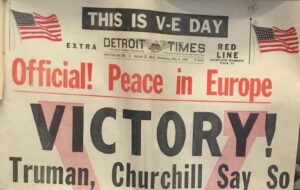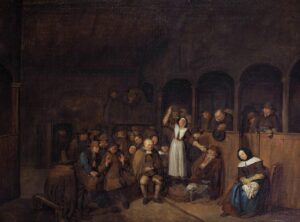
How MAHG Made Me a Better Teacher—Even During a Pandemic
Teachers enroll in our Master of Arts in American History and Government (MAHG) program to gain the content knowledge they need to be more effective. They continue for the intellectual adventure, often calling MAHG the most exciting educational experience of a lifetime.
This summer, for the first time in fifteen years, we’ve had to move MAHG’s summer residency program to an online format. Each intense one-week residential course will now unfold online, over two weeks. Our interactive online program replicates the seminar format of the residential program, with professor-led discussions of primary documents.
Can the adventure continue online? Will it make you a more effective teacher? Can it even make you more effective while using an online platform? Don’t take our word for it. Go to the primary sources: teachers themselves. Here, in reverse order, are teachers’:
Top Ten Ways MAHG Made Me a Better Teacher
10. “During my MAHG studies, I didn’t realize I was gaining valuable experience for online teaching! The WebEx system we use in MAHG is very similar to the Zoom system I’m using during SIP orders. When we moved to online teaching, I was already aware of how the technology works on the student’s end—as well as on my end. At one point in my MAHG foreign policy course, the professor assigned us presentations, giving us control of the online session. So, I already knew to watch for the hand-raising icon. Prior to the SIP order, I could explain to my students how a Zoom session would work.” –Laura M., California
9. “The MAHG’s focus on primary documents was not new to me . . . but the practice MAHG gave me in analyzing primary documents reinforced their importance. When we get in a time crunch—as we are now during the reduced face-to-face time with students possible in an online schedule—we tend to rely on the textbook to get through the curriculum we are supposed to get through. MAHG reminded me not to push primary documents aside. Students learn essential skills and grasp history more fully through analyzing primary documents.”—Lindsay P., New York
8. “MAHG webinars gave me an example of what good online teaching looks like. They also made me more comfortable talking through the somewhat unnatural medium of the computer screen.” —Stacy M., New Mexico
7. “MAHG showed me where to go to get the resources I need to teach with primary documents. It helped me learn what’s out there. It helped me think about the evidence on which we build history—“How do we know what we know?”—so that now I can talk with my students about that.—Donna F., New Hampshire
6. “Out of the documents I have pulled into my digital lessons, the vast majority are from TeachingAmericanHistory.org and my MAHG coursework. Other than the Gettysburg Address and the Mayflower Compact, I would never have known enough about these documents to ask eighth-graders to look at them, were it not for MAHG. I myself had never even read Lincoln’s other speeches! Yet eight-graders love those speeches. Lincoln writes clearly; they can grasp his arguments.”—Melanie S., Ohio
5. “In my own classroom, I combine document analysis with research projects and creative activities. I often use documents to provoke vigorous debates. Today, as I teach online during the pandemic, I have to assign students a little bit less work with a little more leeway in how they complete it. I have to work through the “flat” medium of a computer screen. Fortunately, primary documents are sufficiently 2-dimensional that I can bring up a document and challenge the kids to work through it. I can still tell stories to provide context for documents, stories I learned in MAHG and that humanize the authors. I can continue helping students to understand how much texture there is to the history they think they know, and how many more sides there are to every story. MAHG made me more aware of this complexity. Today, it helps me teach empathy for those who lived before us.”—Rusty E., Maryland
4. Every single class I took in the MAHG program has benefitted me in some way. The broad course offerings allowed me to choose classes related to the areas I teach. I use documents we read in MAHG in APUSH, in government classes, and to help kids prepare for “We the People civics competitions.”—Heather L., Minnesota
3. “The MAHG program helped me become a more accomplished and confident teacher by deepening my knowledge. Each professor in the program was an expert in his or her field of research and brought to the table a comprehensive look at a particular historical era through a collection of primary sources. In particular, the program helped me understand the founding of the United States and has helped me better communicate that story to my students.”—Carla S., Ohio
2. “In every MAHG class, teachers discuss and interpret primary sources. Now I put those documents in students’ hands: to teach critical thinking skills and to allow them to learn directly from the past.” — Kelly E., Michigan
1. “You’ll learn so much from your fellow students—other teachers. You’ll keep sharing ideas and teaching strategies with them after your MAHG studies end. If you were to meet the teachers that I’ve met in MAHG, you’d see the gifts they have—the passion, the deep knowledge, the communication skills. You know these people’s classrooms are in good shape.”—Malik A., California



